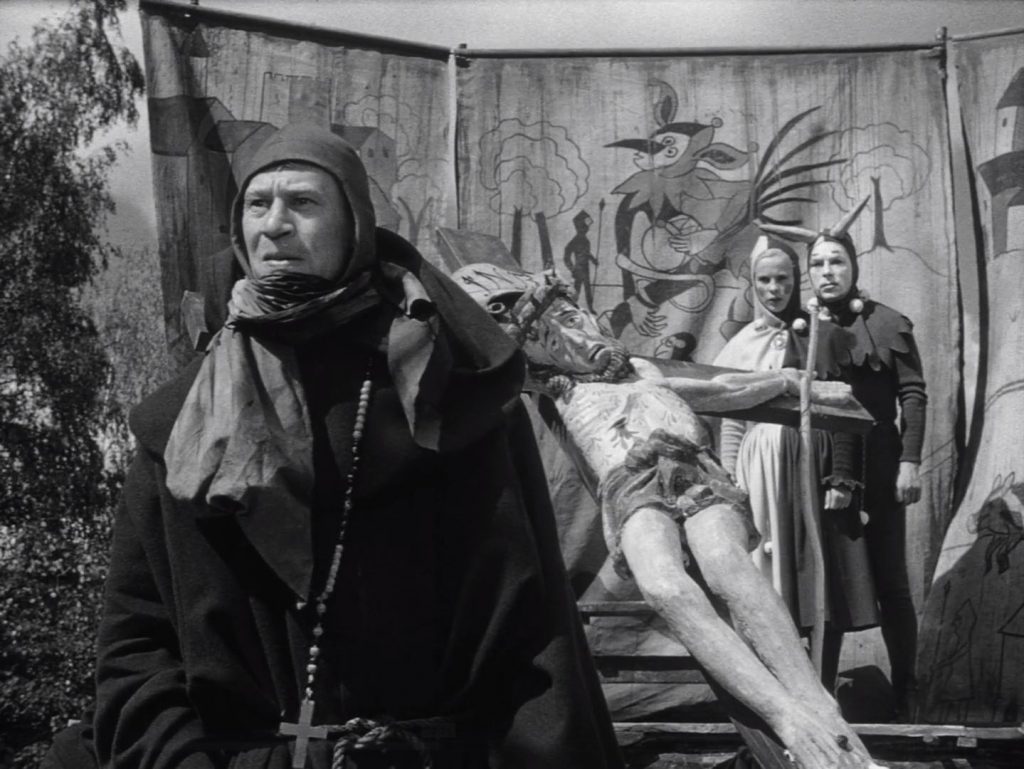
I recently watched Ingmar Bergman’s classic The Seventh Seal for the first time. To be brutally honest, I didn’t enjoy it that much. Maybe it was because I watched it with my roommates who mistook it as a horror flick when we brushed past it on our stroll of the Criterion Channel. Maybe its scenes of the Black Death rang too true to the coronavirus pandemic. Or maybe I just wasn’t in the mood for a slower, reflective film.
I could understand why it launched Bergman onto the world scene. The black and white cinematography was stunning, leaving Max von Sydow’s knight Antonius Bloch in the shadows just as his character’s soul seemed destined to be. The chess match with death provides a beautiful allegory for Bloch’s quest to find life’s meaning before death, becoming one of the most iconic moments in all of film and rightfully so. The film as a whole just seemed too slow, too meandering for me. I thought maybe its themes were of its time or just not relevant for me.

Me trying to figure out my feelings about this film
As I lay in bed that night however, I had some time to chew on it. I had read a couple of reviews trying to see if I was missing something. One observation stuck out to me in particular as I reflected on the film. The reviewer suggested that each character represented a different way to carry on life with the knight and the young family being two important contrasting examples.
The knight’s noble and sacred quest for absolute knowledge about God set him on an impossible task that could only end in disappointment and death. Mia, Jof, and their baby Mikael found the joy and laughter in life, not getting weighed down by more heavy and unanswerable questions that plague Antionus Bloch. Instead, they find glimpses of God in Jof’s simple visions of Mother Mary and in other mundane spiritual moments.
Through this lens, I reexamined the actions of the rest of the film’s characters. The film became less about a knight and his companions navigating the Medival world but about my experience in our modern times. I saw not a group of flagellating apocalyptic religious zealots but people who spend their days wallowing in their own misfortunes and sins hoping to seek penance from a higher being. I saw not a nihilistic squire but someone who has long since given up searching for life’s answers, opting to bide their time until the end.
As I saw different parts of myself in each contrasting worldview, my own interpretation of the film began to transform from a questioning and jaded lens much like Bloch’s to a wondrous and more jovial outlook like Jof’s and Mia’s perspective. After much reflection, I realized that the greatness of The Seventh Seal lies within its contrasting views and unanswered questions it leaves for its audience to grapple with. It doesn’t pretend to answer any of life’s important questions but simply acts as a vehicle to pose its questions to its viewers.

Two very contrasting worldviews
Some great films are like The Seventh Seal, a reflective look at complex characters that require some time to think alongside the perspective of others and a rewatch. Other great films pull you in from the first frame into a heart-pounding, well-structured mystery or romance. Other great films challenge you with their absurdity and lack of meaning. Other great films make you forget about the world around you with non-stop laughter and memorable characters. Some great films create a character so real that you know exactly how they feel or how they think.
Whatever type of film it is, all great films start at the end credits. They take on a life of their own after the last frame. You think about them as you walk out of the theater, that night as you lie in bed, or in the shower the next morning. You quote them to your friends and families. You rewatch them and find something different than your first viewing. Great films inspire you to learn about those involved with the film’s production and lead you to other films they made or were involved in.
Great films can be about anything, come from any time period, or be made by anyone. Any film really can surprise you and become a great film that you’ll return to over and over. The exciting thing is there is no canon of great films list determined by the Sight and Sound Poll or Robert Ebert, although those can be great starting points. We each are the ones who discover and add great films to our own viewing experiences and lives. In short, a great film leaves a lasting impression on its audience just like my wrestle with Bergman’s The Seventh Seal left me with.



